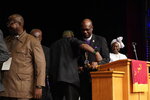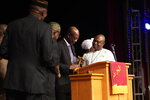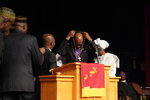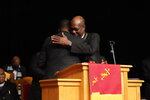By Bishop Hilliard K. Dela Dogbe, President of the Board of Bishops
Greensboro, NC - To the Senior Bishop, The Immediate past President, and members of the Board of Bishops, Beloved of Zion, I stand before you with great joy and excitement, yet with humility to accept this responsibility to serve in this historic position of President of the Board of Bishops of The
African Methodist Episcopal Zion Church, the church of my birth, the church of my conversion and the Church of my calling. Beloved, my address, though brief, is in two parts: My Government and my Vision/Appeal, which is a call to Missions.
MY GOVERNMENT
Some have questioned the eight-year wait for those of us elected under the category of “Indigenous Resident Bishops” before ascending to the presidency of the Board of Bishops. As some of you may know, my response has always been the same: “It doesn’t bother me because I didn’t offer myself to be president. I offered myself to be Bishop in the Church to live amongst my people in
Western West Africa and to serve them. Being president is an added advantage, and I am grateful for the opportunity to serve in this capacity.
The Second question I need to address is: “How are you going to be president when you live in Africa? Again, my answer remains the same: The A.M.E. Zion Church is a global Church, and the people of Africa also need to have the President live amongst them; see him, feel him, wine, dine, and fellowship with the President. Secondly,
COVID-19 has brought with it some great relief with the advantage of virtual meetings, and the Board has effectively utilized this tool in many ways. I will definitely use this mode in providing leadership.
Thirdly, and more importantly, in Ghana (and Africa, for that matter), we have chiefs and kings who have to be away from their jurisdiction of service for several reasons. Two options are often available to them as to governance – one is to appoint a regent from the family who shall sit in for the Chief as his official representative in all matters in his/her absence. The problem with this is sometimes regents have either abdicated or imposed themselves on the people and the stool. The other option for governance is for the most senior elder of the council of elders to provide leadership and superintend over all affairs of the State in the absence of the Chief. This approach is more in tandem with our
Book of Discipline regarding conference administration. In this instance, the Board of Bishops is the Council of Elders, and the Senior Bishop is the most senior elder of the Council (Board). To this end, I wish to announce that where I am needed on the States-side, and I cannot be available as president, the Senior Bishop,
Bishop Darryl Brewster Starnes, shall be the official representative of the President of the Board of Bishops and shall sit on all matters appertaining to that office (but once I am in town, he yields to me as president).
Beloved, now my Vision:
A CALL TO MISSIONS
One issue we ought to think through as a denomination is the nomenclature used to describe the Church outside the United States. Currently, the
Department of Church Growth and Development and some others use aviation language, domestic and international, whereas some other organizations in the Church use the terminology International President for the leader. Our
Missionary Society uses the language of Home and Overseas. The denomination adopted to use
Global Missions, a name which has seen several metamorphoses and yet does not seem to mean what it is supposed to mean by its adoption. Global Missions would seem to mean the overall missions machinery of the Church. However, it seems to be about the missions’ outlook of the Church outside North America, as we still use Home Mission for the mission churches in North America. Let us consider Global Missions:
Records suggest the Department was conceived in 1880 (at the same time as the Women’s Home and Foreign Missionary Society) by
Reverend Mark M. Bell.
The first name for this ministry was the General Home and Foreign Missions Board. Its purpose and objective was to labor mainly for foreign missions.
The Home Missions part of the work was supported largely by the work of the Daughters of Conference.
The Woman’s Home and Foreign Missionary Society gave little support to Home Missions until 1944 when the General Conference voted that they should give 40% of the Society’s budget to Home Missions.
Later, the General Conference equalized the 40% for both home and overseas missions.
With time, different name changes took place, which mainly were to use what was appropriate to describe the Church outside North America. The concept was first called Home and Foreign Missions Board, and General Home and Foreign Missions Board was its constitutional label (1880); General Mission Board (1880-1888); Foreign Missions Board (1896-first incorporated in 1920); Board of Missions (1900-1904); Department of Foreign Missions (1904); Foreign Missions separated from Home Missions (1916); Department of Overseas Missions replaced Department of Foreign Missions and it too received a name change in 2012. The necessitation of name changes may be predicated upon the focus of ministry as well as contemporary names for labeling others as foreign in a melting pot society. The name for the Department of Global Missions was changed in 2012 from the Department of Overseas Missions as directed by the 49th Quadrennial Session of the General Conference. Does this include Home Missions? Why Global if it does not include Home Missions? Let us think about this thing!
FUNDING GLOBAL (OVERSEAS) MISSIONS
Indeed, WHOMS is a vital supporter of Global Missions and a vibrant partner in Zion’s Missions Enterprise.
They supplement the DGM and implore as well as explore others to partner in missional projects. The Department of
Global Missions is currently supported in this wise:
The Missionary Seer subscriptions, the Connectional Budget Board, the Women’s Home and Overseas Missionary Society, disaster relief donations,
Global Missions Sunday donations, mission trips, etc.
Certainly, Missions are expensive, and many needs could be met with more support.
It is imperative to remind ourselves that the mission of the Church is Missions. God commanded it, Christ Commissioned it, the Apostles committed to it, and the Holy Spirit enabled it; consequently, the Church grew by it. For our sustained growth as a Church, it is imperative to remind ourselves that Missions is everybody’s business. It is our core Christian mandate; it is what we are to be about. Our programming, constructions, and all services must be in service to our participation in the Mission of God: to go into the world and make disciples. God is still in the sending business, and if you cannot go out, you can reach out with your money to enable others to go.
According to the Executive Director of Global Missions,
Dr. Dwight Cannon, over the years, each Executive Director (formerly Secretary-Treasurer) and each
Board of Global Missions has done well to keep missions a priority in the ministry of Zion Methodism.
However, as Rev. Dr. Cannon would say, “Adequacy is inadequate when we see how much more needs to be done.” Adequacy may be gauged based on the time, season, and locale for doing missions.
A common denominator in measuring the success of fulfilling the mandate for missions is the commitment of the missionaries and financial support from missions’ advocates.
The mission is both our individual effort and our collective responsibility; it is the responsibility of all, even though only a few have committed to it. Matthew 9:37-38(KJV) helps us: “
Then saith he unto his disciples, The harvest truly is plenteous, but the laborers are few; Pray ye, therefore, the Lord of the harvest, that he will send forth laborers into his harvest.” From this text, we learn:
1.
The work of missions is much. 2.
The true missionaries are few. 3. The need for prayer to do missions is paramount.
4.
The mission's harvest (success/fruit) belongs to God.
5.
Only God can send forth missionaries.
Beloved people of Zion, we need more missionaries, more prayers, and more support.
I, therefore, implore all of you, Zionites across the globe, with this CALL TO PRAYER FOR MISSIONS!!!
Furthermore, considering the cost of Missions and the enormous demand for resources to grow our Mission Churches, Mission Districts, and mission conferences, there is an urgent need to pool resources to save our Missions field and, thereby, the future of our denomination. In consultation with the Chair of the Board of Global Missions, the Executive Director of Global Missions, and my colleagues on the Board of Bishops, of which I am the President, I make this humble plea to all Zionites in North America to make a one-time donation of $100 to a Special Missions Development Fund. For Conferences outside the United States and other situations in the States where the minimum of $100 is an impossible feat, Bishops should determine the minimum donation and encourage all members to commit to this. This fund is to be received and paid to the Department of Global Missions on or before January 31. This is not a Missions Sunday appeal, nor is it a substitute for that. Also, it does not in any way replace any of the fundraising activities of the Women’s Home and Overseas Missions Society. This is a one-time appeal to provide a reserve fund or investment base for Missions. It is imperative, therefore, for each member of our Church to commit to support this call to Missions.
In furtherance of this, each Bishop shall appoint a Missions Fund Coordinator (listed below) who shall work with their respective Bishop to provide general oversight over these collections and remit the same promptly to the DGM. Bishops shall also appoint conference and District Coordinators to help with the collection and transmission of the collections. The DGM shall establish a Missions Development Fund, which shall be a special fund managed by the Board of Missions. This shall be a reserve fund that can only be assessed upon authorization by the Chairperson of the Board of Global Missions. A report on this shall be presented at our next Board of Bishops Meeting in February.
Beloved, thank you for your commitment and willingness to support this initiative. I am grateful to God for the privilege to serve, to the Board of Bishops for electing me as your President, and to all of Zion for your willingness to partner with me in this Call to Missions. The hymnist
Daniel Marsh puts it succinctly when he wrote:
Hark, the voice of Jesus calling,
Who will go and work today?
Fields are ripe and harvests waiting,
Who will bear the sheaves away?
Long and loud the Master calls us,
Rich reward He offers free;
Who will answer, gladly saying,
Here am I, send me, send me?
If you cannot cross the ocean,
And the distant lands explore,
You can find the lost around you,
You can help them at your door;
If you cannot give your thousands,
You can give the widow’s mite;
What you truly give for Jesus,
Will be precious in His sight.
If you cannot speak like angels,
If you cannot preach like Paul,
You can tell the love of Jesus,
You can say He died for all.
If you cannot rouse the wicked,
With the judgment’s dread alarms,
You can lead the little children
To the Savior’s waiting arms.
If you cannot be the watchman,
Standing high on Zion’s wall,
Pointing out the path to Heaven,
Offering life and peace to all,
With your prayers and with your bounties
You can do what Heaven demands;
You can be like faithful Aaron,
Holding up the prophet’s hands.
If among the older people,
You may not be apt to teach,
Feed My lambs, said Christ, our shepherd,
Place the food within their reach.
And it may be that the children
You have led with trembling hand,
Will be found among your jewels,
When you reach the better land.
Let none hear you idly saying,
There is nothing I can do.
While the lost of earth are dying,
And the Master calls for you;
Take the task He gives you gladly;
Let His work your pleasure be;
Answer quickly when He calls you,
Here am I, send me, send me.
Humbly Submitted by His grace and for His glory,
President, Board of Bishops
The Missions Fund Coordinators of the various Episcopal Districts are:
Western West Africa & Rwanda – Rev. Daniel M. Doe and Rev. Felix Uwamahoro
Eastern West Africa – Rev. Dr. Umor Olu
Southwestern Delta – Rev. Janice Nelson
Western – Rev. Celest Ary
Central-Southern Africa – Ana Pedro Cardoso Canda
Thank you for your support!!!







Comments
No comments on this item Please log in to comment by clicking here